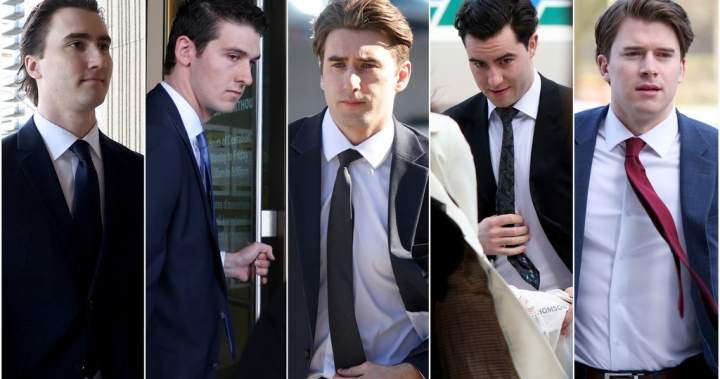As a journalist who has covered legal affairs for more than a decade, I’ve witnessed how institutions respond when faced with allegations of wrongdoing. Few cases have revealed the complex interplay between sports culture, institutional accountability, and justice as starkly as the Hockey Canada sexual assault scandal.
The timeline of events surrounding allegations against members of Canada’s 2018 and 2003 World Junior hockey teams reveals a troubling pattern of delayed accountability and institutional protection that has shaken the nation’s most beloved sport to its core.
In May 2022, Canadians learned that Hockey Canada had quietly settled a $3.55 million lawsuit alleging sexual assault by eight players from the 2018 World Junior team. What followed was a cascade of revelations that would ultimately force a complete overhaul of the organization’s leadership and spark a national reckoning about hockey culture.
The settlement, which resolved allegations stemming from a London, Ontario incident following a Hockey Canada Foundation gala, immediately raised questions about the organization’s handling of sexual misconduct. Court documents alleged that eight unidentified players sexually assaulted a woman identified only as “E.M.” in a hotel room after she had consumed alcohol and drugs.
“This case represents a profound failure of leadership,” said Katherine Henderson, who would later become Hockey Canada’s president and CEO in the wake of the scandal. “We cannot simply move forward without acknowledging the harm caused and the trust broken.”
The London Police Service initially investigated the allegations in 2018 but closed the case without charges in February 2019. However, following public outcry after the settlement became known, police reopened their investigation in July 2022. Parallel to this, Hockey Canada commissioned former Supreme Court Justice Thomas Cromwell to conduct an independent review of its governance structures.
The Canadian government’s response was swift and decisive. Then-Sport Minister Pascale St-Onge froze federal funding to Hockey Canada in June 2022, demanding greater transparency and accountability. Major sponsors including Scotiabank, Tim Hortons, and Canadian Tire quickly followed suit, suspending their financial support.
During parliamentary hearings in July 2022, perhaps the most damaging revelation emerged: Hockey Canada maintained a special “National Equity Fund,” partially funded by player registration fees, which had been used to settle sexual assault claims without public disclosure. Documents obtained through parliamentary inquiry revealed this fund had paid out $7.6 million in nine settlements related to sexual assault and abuse since 1989.
“The idea that registration fees from parents enrolling their children in hockey were being used to settle sexual assault claims without their knowledge represents a profound breach of trust,” noted Sheldon Kennedy, a former NHL player and advocate for abuse victims in sport, in testimony before Parliament.
As public pressure mounted, Hockey Canada’s leadership began to crumble. CEO Scott Smith and the entire board of directors resigned in October 2022, marking the beginning of a complete organizational overhaul. The following month, Hockey Canada members voted to accept a new board of directors and governance structure based on recommendations from the Cromwell report.
Just as the organization was attempting to rebuild, another shock came in December 2022: allegations emerged regarding a separate group sexual assault involving members of the 2003 World Junior team at a tournament in Halifax. Police investigations were launched in both Quebec and Nova Scotia.
Throughout 2023, legal proceedings continued to unfold. Five players from the 2018 team were charged with sexual assault in January 2024, including NHL players Carter Hart, Michael McLeod, Dillon Dubé, and Cal Foote, along with former NHL player Alex Formenton. All five have denied wrongdoing through their legal representatives.
Dr. Loretta Merritt, a lawyer specializing in sexual abuse cases, observed that “this case has forced Canadians to confront the reality that elite status in sport doesn’t exempt individuals or institutions from accountability. The criminal justice process must now determine individual culpability, but the institutional failures have already been laid bare.”
Testimony from former Hockey Canada officials revealed that no players from either the 2018 or 2003 teams were mandated to participate in the organization’s internal investigations. This lack of cooperation hindered efforts to establish facts and accountability, according to documents from parliamentary hearings.
The Hockey Canada scandal has triggered broader examinations of sport culture in Canada. The Standing Committee on Canadian Heritage’s report, released in early 2023, called for mandatory reporting of abuse, independent oversight mechanisms, and wholesale cultural change in sports organizations.
As the criminal cases proceed through the courts in 2024, the legacy of this scandal continues to unfold. Hockey Canada has implemented new mandatory training on consent, sexual violence, and toxic masculinity for all national team members. The organization has also created an independent mechanism for reporting abuse and misconduct.
The reverberations extend beyond hockey. Sport Canada has instituted new funding requirements for all national sports organizations, mandating transparent abuse reporting mechanisms, victim support services, and regular independent governance reviews.
For many observers, the timeline of the Hockey Canada scandal represents both institutional failure and the potential for meaningful reform. The questions that remain—about justice for victims, about changing entrenched cultures, about ensuring accountability—will likely take years, not months, to answer.






